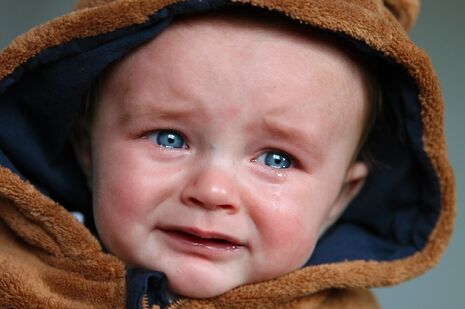Writing poetry is like mothering a child
Poems, much like children, require the right kind of nurture if they are to grow up healthy and strong: Liam Etheridge talks us through the dos and don’ts of poem-raising

Writing poetry is like mothering a child. As soon as the lid closes on your laptop or your pen, the chord is cut and your poem totters off into the world, while you recover from a painful labour. Your poem will go on to lead a life of its own; some will use, misinterpret, abandon it; some may even try and turn it against you or lead it so far astray that it ceases to be recognisable. Others, however, will be kind to it, care for it and even love it.
Like a child, your poem has to be equipped against the rough and tumble of other eyes hands and minds. Student poetry readings are crèches; anxious parent poets let their offspring tumble clumsily across a room full of ears, jutting inscrutably, as handles or bludgeons, as your poem reaches unsteadily for support. The trick is finding a good crèche.
A bad poetry event, like a bad crèche, greets the finest pasta collage and the poo in the sandpit with the same ecstatic adulation. “My, you did that? All by yourself? Have a sticker”. Equally bad would be a crèche in which refusing to share one's toys is punishable by firing squad.
"If comedy sketches were kids, pitching a sketch to a room of comedians would be like throwing them into the sea"
On the other hand, a good workshop is one which develops your poem in to a rounded individual. While this needn’t be too prescriptive, basic principles may be laid out to provide proper care. For instance, no poem should bring harm to itself; whatever it is doing, it must be going about it the right way. We don’t let children use crayons to wipe their bum; not because we disapprove of crayons, bums, or hygiene, but because bums are not best wiped with crayons. That is not to say that it can’t be done, or that it can’t be done well, but in those cases the question will be asked: “why?”
New poetry needs criticism as a crèche needs childcare specialists; for them to do their job, to carry the poem or child into maturity, they need to be able to get at them, argue, and finally reconcile with them. I think, too often, the crèches can be a little too permissive. It is important that poets are encouraged; all work, like all life, is valuable insofar as it has been created and deserves to live. But this should not come at the expense of critical rigour.
I have had some experience writing comedy sketches at my last university. If comedy sketches were kids, pitching a sketch to a room of comedians would be like throwing them into the sea. “Instinct will kick in at any moment”, you think, “they’ll swim, you’ll see… any moment now… they’ll surely come up for air soon… surely…”
It’s hard to watch a sketch sink. No less than a poem, they are of you; but they are brought to a far more singular purpose. Poetry has many and several vocations, and this treatment isn’t right for all of them. But something can be learned from this plunge of faith: poetry which wants to walk, talk, and work for itself, to be more than the vicarious mouthpiece of the parent poet in a suicide pact, needs to withstand readers. “Here is a haiku, about an ugly boil, beneath my left eye”; “meet my son, he is three years old and plays grade 8 trumpet, taking after his old dad.”
Neither the poem nor the child in these instances are likely to be fit for company. This is not to impose anything hard or fast about what poetry or parenting should be. Some children are chatty, others are not; some are complex, others less so. Poems are under no obligation to disclose themselves totally to anybody who asks (this would be a kind of abuse), nor must they be always enigmatic. All a poem must do is say something of its own; not the same thing to everyone, indeed not anything to anyone particularly, so long as something, somehow, is said.
So next time you attend a crèche or a poetry reading, keep the same things in mind. No child and no poem benefits from a pat on the back for a fart farted or a rhyme rhymed unless these are to the good. We don’t impose, but we suggest; when behaviour or practice is obnoxious in some way, we challenge and correct, or allow them to take their own path. We owe this care to each other as poets, and we owe it to our poems as our kids
 Comment / Plastic pubs: the problem with Cambridge alehouses 5 January 2026
Comment / Plastic pubs: the problem with Cambridge alehouses 5 January 2026 News / Cambridge academics stand out in King’s 2026 Honours List2 January 2026
News / Cambridge academics stand out in King’s 2026 Honours List2 January 2026 News / Cambridge businesses concerned infrastructure delays will hurt growth5 January 2026
News / Cambridge businesses concerned infrastructure delays will hurt growth5 January 2026 News / AstraZeneca sues for £32 million over faulty construction at Cambridge Campus31 December 2025
News / AstraZeneca sues for £32 million over faulty construction at Cambridge Campus31 December 2025 Interviews / You don’t need to peak at Cambridge, says Robin Harding31 December 2025
Interviews / You don’t need to peak at Cambridge, says Robin Harding31 December 2025










